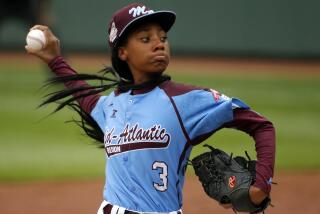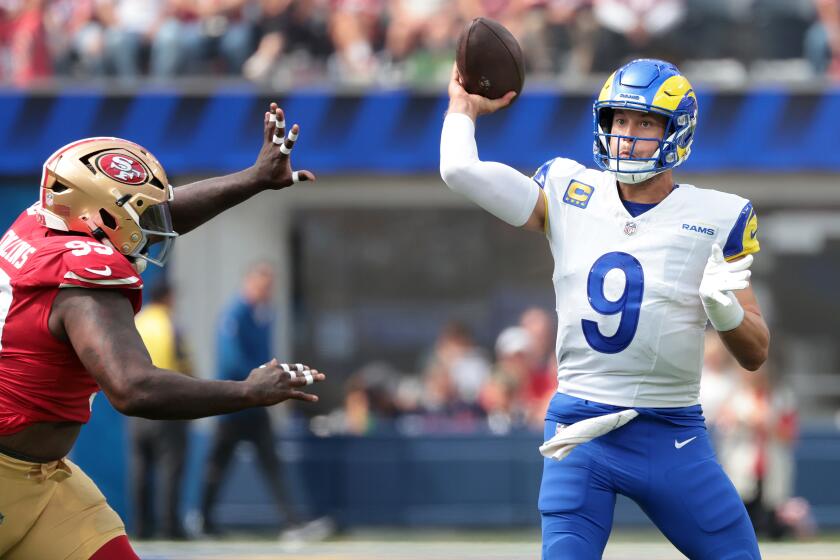12 Years Later, Youth Serves Up Teltscher Loss
- Share via
INDIAN WELLS — Eliot Teltscher never thought it would take him 12 years to realize how Cliff Richey felt on that day they played at Mission Hills Country Club in Rancho Mirage.
For Teltscher, the victory over Richey in 1976 came to mind when he played 16-year-old Pete Sampras Wednesday at nearby Grand Champions Resort.
This time, however, the 28-year-old Teltscher was trying to stop a teen-ager from making his mark. Youth again prevailed.
Sampras recorded the biggest victory of his career, defeating Teltscher, 7-5, 6-3, in the second round of the $702,500 Newsweek Champions Cup.
“Twelve years ago at the same tournament,” said U.S. Davis Cup captain Tom Gorman, shaking his head in wonder. “Same thing, teen-ager against the veteran. Eliot was saying now he knows how Cliff Richey must have felt.”
A few hours later, the Richey match was the first thing Teltscher mentioned when he met with the press.
“It’s tough,” said Teltscher, seeded 10th. “I remember . . . when I was 17 and I played Cliff Richey. I now can understand what he was going through. It’s really hard because I played then really loose, and for Pete it’s easy.
“It’s easy when you start because no one expects anything of you. Everything you do is a bonus. It’s easier at the beginning.”
Sampras and Teltscher could have easily played this match in Palos Verdes, and actually, they have played many times there. Teltscher is from Palos Verdes Estates, and Sampras lives in Rancho Palos Verdes, but this is the first time they’ve met in a tournament.
Sampras, playing in his second professional event, thought his familiarity with Teltscher’s game helped him win the match.
“I was confident, since I know his game and he knows mine,” Sampras said. “So I wasn’t surprised by anything he did.”
Reaching the third round of a prestigious tournament filled with big names has surprised Sampras.
He went through qualifying, defeating No. 1-seeded qualifier Todd Nelson in the second round. In the first round of the main draw, Sampras fought off five match points in a third-set tiebreaker en route to his victory over No. 37-ranked Ramesh Krishnan.
Teltscher looked to be a considerably tougher test because of his No. 25 ranking and his excellent results last year, which moved him back into the top 20 by the end of 1987.
But Sampras showed no signs of nervousness and broke Teltscher in the opening game. Teltscher broke back in the sixth game, and they stayed on serve until 5-5. In the 11th game, Sampras broke Teltscher at 30 when Teltscher hit a forehand lob long. Then, Sampras won the first set as he held at 15, winning with a forehand volley.
Again, in the second set, the players exchanged early service breaks before getting back on serve. After Teltscher broke Sampras to tie it, 3-3, Sampras broke right back and did it again on Teltscher’s next service game.
“I felt like I lost to a good player,” Teltscher said. “He is a good player. That’s the bottom line of it. Obviously, he beat Krishnan, so you knew, at that point, he was a good player. I knew it before from practicing and playing with him.
“I didn’t play the match of my life out there. I was a little tentative. He serves well and volleys well and he’s aggressive. I needed to serve well and keep the ball deep. He was smart. He took my second serve and he came in. Whenever he got a short ball, he hit it and came in. He pressured me throughout the match when I didn’t keep the ball deep enough to keep him off the net.”
A strong net game hasn’t always been a Sampras trademark. Not long ago, he had a weak serve and net game, and a good two-handed backhand. But, showing remarkable foresight, he and his longtime coach Pete Fischer realized it would take more to succeed on the pro tour, even if he was winning in the juniors.
The new game didn’t come easily and it showed during his first summer on the junior circuit with the one-handed backhand and commitment to rushing the net. Sampras’ ranking dropped to No. 56 in the 18-and-under division for 1986, and he didn’t progress past the third round in any of the major U.S. national junior events.
“It was extremely hard,” Sampras said of the switch. “I wanted to go back, but my coach told me to stick with it.”
It took eight months before Sampras felt comfortable with the stroke, and it took a little longer before he began recording impressive junior results again. Last summer, the move began to look very wise when he reached the final of the National Hardcourts, losing to Michael Chang, and then, avenging the loss as he beat Chang in the U.S. Open junior event.
“There was a lot of agonizing with the one-handed backhand and he fought it,” Fischer recently told a national tennis magazine. “But he just wasn’t going anywhere with the two-hander. He couldn’t play the net with it. Now his one-handed backhand is better than his two-hander ever was. And he can do so much more with it.”
Which was illustrated during the match against Teltscher. Next, Sampras meets No. 8-seeded Emilio Sanchez of Spain. As for the loser of Wednesday’s match, Teltscher certainly won’t be forgetting it soon.
“I wish him the best,” Teltscher said. “I know him and he’s a good kid. But when I’m out playing I want to win no matter who I’m playing. It’s a bit of a tough loss for me.”
Still, despite the result, as he was leaving the press conference, Teltscher joked about his prematch discussion with Sampras, saying:
“I asked him if his truant officer knew he was away from school.”
Tournament Notes
Generally, most of the matches have followed form here. That is, until Wednesday. Four seeded players lost, including Eliot Teltscher. American Tim Mayotte, the fifth-seeded player, lost in straight sets to Johan Kriek. This development wasn’t much of a surprise because Kriek had two match points against Mayotte last week in Philadelphia before losing. Mayotte won the tournament. The other seeded players to lose Wednesday were No. 6 Martin Jaite and No. 13 Christo van Rensburg. . . . The attendance was 5,850. . . . Also, on Wednesday, Stan Smith was named the USTA’s director of player development. The list of candidates had been narrowed to three other coaches, however, Smith was a late entry.
More to Read
Go beyond the scoreboard
Get the latest on L.A.'s teams in the daily Sports Report newsletter.
You may occasionally receive promotional content from the Los Angeles Times.











